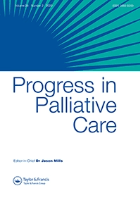
PROGRESS IN PALLIATIVE CARE
Scope & Guideline
Enhancing holistic approaches in palliative healthcare.
Introduction
Aims and Scopes
- Pain Management Strategies:
The journal frequently publishes research on innovative approaches to pain management for patients in palliative care, including pharmacological treatments and alternative therapies. - Integration of Palliative Care:
A core area of focus is the integration of palliative care into various healthcare settings, including primary care, emergency services, and community-based services, ensuring a collaborative approach to patient management. - Patient and Family Perspectives:
Research often highlights the experiences, values, and preferences of patients and their families, emphasizing the importance of patient-centered care in palliative settings. - Interdisciplinary Collaboration:
The journal explores the roles and contributions of different healthcare professionals in palliative care, advocating for a multidisciplinary approach to enhance service delivery. - Cultural and Community Considerations:
There is a consistent emphasis on understanding cultural contexts and community influences on palliative care, addressing the diverse needs of populations. - Technology in Palliative Care:
Emerging studies focus on the use of technology, including telehealth and mobile applications, to improve access and quality of palliative care services.
Trending and Emerging
- Telehealth and Remote Care Models:
The rise in research on telehealth solutions showcases a growing interest in leveraging technology to enhance palliative care delivery, particularly in rural and underserved areas. - Research on Non-Pharmacological Interventions:
Emerging studies are increasingly exploring non-pharmacological interventions, such as psychological support and holistic therapies, to address the complex needs of palliative patients. - Impact of COVID-19 on Palliative Care Practices:
Research focusing on the implications of the COVID-19 pandemic for palliative care delivery is prominent, examining adaptations in care protocols and the psychosocial effects on patients and families. - Culturally Competent Care:
There is a notable increase in studies addressing the importance of culturally competent care, particularly in diverse communities, to ensure that palliative care is respectful and responsive to cultural values. - Advance Care Planning and Decision-Making:
Research emphasizing advance care planning and shared decision-making is gaining traction, highlighting its role in improving patient autonomy and aligning care with patient values.
Declining or Waning
- Traditional Hospital-Centric Models of Care:
There is a noticeable decrease in research focused solely on hospital-based palliative care, as the emphasis shifts towards community-based and integrated care models. - Pharmacological Interventions Alone:
Papers concentrating exclusively on pharmacological approaches to symptom management are less frequent, indicating a broader interest in holistic and multidisciplinary strategies. - End-of-Life Care Protocols:
Research centered on rigid end-of-life care protocols is becoming less common, as the field increasingly advocates for personalized and flexible care plans that cater to individual patient needs. - General Awareness Campaigns:
There has been a reduction in articles solely focused on general public awareness campaigns about palliative care, suggesting a shift towards more targeted and specific community engagement initiatives. - Historical Perspectives on Palliative Care:
Themes focusing on the historical development of palliative care practices are waning, as contemporary issues and innovations take precedence in research discussions.
Similar Journals

Medycyna Paliatywna-Palliative Medicine
Delivering Evidence-Based Strategies for Care ExcellenceMedycyna Paliatywna-Palliative Medicine is a vital academic journal dedicated to advancing the field of palliative care, published by TERMEDIA PUBLISHING HOUSE LTD. With its ISSN 2081-0016 and E-ISSN 2081-2833, this journal serves as a reputable source of high-quality research and compelling insights for scholars, healthcare professionals, and students committed to improving the quality of life for patients with serious illnesses. Although it does not currently offer Open Access, Medycyna Paliatywna ensures that articles published within its pages undergo rigorous peer review, reflecting the highest standards in medical research. The journal aims to contribute to the ongoing dialogue in palliative medicine, encouraging innovative practices, sharing evidence-based strategies, and fostering collaboration among healthcare providers. By disseminating important findings and clinical insights, Medycyna Paliatywna plays a crucial role in shaping the future direction of palliative care, making it an essential resource for anyone involved in this critical field.
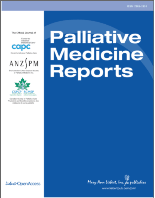
Palliative Medicine Reports
Fostering interdisciplinary collaboration for holistic healing.Palliative Medicine Reports, published by MARY ANN LIEBERT, INC, is an esteemed Open Access journal dedicated to advancing the field of palliative care and pain management. Since its inception in 2020, this journal has established itself as an important platform for researchers and practitioners in the domains of Advanced and Specialized Nursing, Anesthesiology, and Pain Medicine. With an impressive Q2 ranking in both Advanced and Specialized Nursing and Anesthesiology and Pain Medicine, and a Q3 ranking in the Health (Social Science) category, it stands out as a reputable resource for disseminating high-quality research. The journal fosters an interdisciplinary approach, aiming to bridge gaps in knowledge and practice related to palliative care and the holistic needs of patients experiencing serious illness. Researchers, clinicians, and scholars are encouraged to contribute their work, benefitting from the journal's broad visibility and rigorously peer-reviewed process, ensuring that critical advancements in the field receive the attention they deserve.

Palliative Care & Social Practice
Transforming lives through quality palliative care scholarship.Palliative Care & Social Practice is a leading academic journal published by SAGE Publications Inc, dedicated to advancing the field of palliative care and related social practices. Since its transition to Open Access in 2019, the journal has been committed to disseminating high-quality research and practical insights that inform practitioners, policy-makers, and scholars alike. Based in the United Kingdom, the journal boasts an impressive categorization of Q1 in Advanced and Specialized Nursing for 2023, reflecting its influential status in the field. With a Scopus ranking of 15/63 in Advanced and Specialized Nursing and 182/636 in General Medicine, it is recognized as a vital resource for those engaged in the compassionate care of patients and the complexities of their psychosocial needs. The journal’s scope encourages interdisciplinary dialogue and is essential for anyone striving to enhance the quality of life through effective palliative care practices.
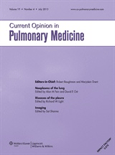
CURRENT OPINION IN PULMONARY MEDICINE
Connecting Experts in Pulmonary ExcellenceCurrent Opinion in Pulmonary Medicine, published by Lippincott Williams & Wilkins, is a vital resource for professionals in the field of pulmonary and respiratory medicine. With a robust ISSN of 1070-5287 and an E-ISSN of 1531-6971, this journal has been converging insightful research and expert opinions since 1995. It currently holds a respectable Q2 category ranking in the 2023 Scopus rankings for pulmonary and respiratory medicine, placing it within the 74th percentile of its field. The journal provides an excellent platform for clinicians, researchers, and students to keep abreast of the latest developments, trends, and therapeutic advances, ensuring that it remains an essential component of ongoing education and scholarship in respiratory health. While not open access, the journal offers various subscription options to facilitate access to cutting-edge pulmonary research. Located in Philadelphia, Pennsylvania, Current Opinion in Pulmonary Medicine continues to shape the future of respiratory medicine through its commitment to high-quality content and academic excellence.

INTENSIVE CARE MEDICINE
Empowering Excellence in Intensive Care PracticesINTENSIVE CARE MEDICINE is a premier academic journal in the field of critical care and intensive care medicine, published by SPRINGER. With an impressive HIndex and a remarkable impact factor, this journal consistently ranks in the top quartile of its category, achieving Q1 status for 2023. Spanning over four decades since its inception in 1977, it serves as a crucial platform for disseminating groundbreaking research and clinical advancements that shape the future of intensive care. Notably, it holds a distinguished position in the Scopus rankings, placed #1 out of 110 in its field, reflecting its importance and influence among researchers and clinicians alike. Although it is not an open-access journal, it offers various subscription options, ensuring wide accessibility to its high-quality content. The journal is dedicated to enhancing knowledge and practices within the critical care community, making it an indispensable resource for practitioners, researchers, and students pursuing excellence in intensive care medicine.
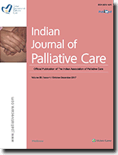
Indian Journal of Palliative Care
Connecting research to practice for enhanced patient well-being.Indian Journal of Palliative Care is a premier peer-reviewed publication dedicated to advancing the field of palliative care within the broader domains of health policy and public health. Published by SCIENTIFIC SCHOLAR LLC in India since 2003, this Open Access journal is committed to providing a platform for innovative research and practices that promote quality of life for patients with life-limiting illnesses. With a focus on health policy and environmental and occupational health, the journal holds a respected position in the Q3 quartile for both categories, reflecting its significant contributions to scholarly discourse. Ranked #393 in Public Health and #185 in Health Policy according to Scopus, it serves as an essential resource for researchers, professionals, and students seeking to deepen their understanding of palliative care and its implications within public policy and health frameworks. Through its rigorous editorial standards and broad accessibility, the Indian Journal of Palliative Care plays a vital role in shaping effective solutions and policies that aim to enhance patient care and well-being.
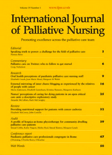
International Journal of Palliative Nursing
Empowering Healthcare Through Palliative InsightsInternational Journal of Palliative Nursing is a renowned peer-reviewed journal dedicated to advancing the field of palliative care and nursing. Published by MA HEALTHCARE LTD in the United Kingdom, this journal has been a pivotal resource for healthcare professionals, researchers, and students alike since its inception in 2000. With an ISSN of 1357-6321, it is well-regarded for its commitment to high-quality research and practical insights, maintaining a Q3 category ranking in Advanced and Specialized Nursing. Despite its non-open access format, the journal offers a wealth of knowledge through a diverse array of articles that cover the latest advancements and best practices in palliative nursing. Its Scopus Rank at #36/63 reflects its respectable standing in the nursing community and highlights its contributions to the interdisciplinary realm of palliative care. The journal is an invaluable platform for fostering dialogue and sharing innovative approaches to nurture compassionate patient care.
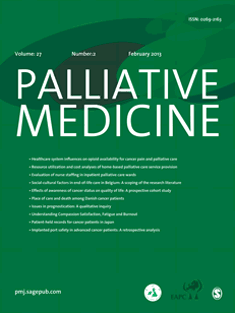
PALLIATIVE MEDICINE
Fostering Knowledge for Quality End-of-Life CarePalliative Medicine is a premier journal dedicated to advancing the field of palliative care, published by SAGE Publications Ltd. Established in 1987 and continuing through 2024, this esteemed journal focuses on the integration of pain management and comprehensive care for patients with life-limiting illnesses. With its impressive impact factor and a prestigious Q1 ranking in both Anesthesiology and Pain Medicine, as well as in Medicine (miscellaneous), it stands as a critical resource for researchers, healthcare professionals, and students engaged in this vital area of medicine. The journal emphasizes original research, reviews, and clinical studies that contribute to the understanding and practice of palliative care, promoting improved quality of life and support for patients and their families. Although not open access, articles are accessible through institutional subscriptions, ensuring the dissemination of knowledge to a wide audience. Whether you are a seasoned researcher or an emerging professional in the field, Palliative Medicine remains an invaluable platform for scholarly exchange and innovation.
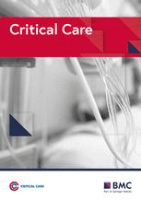
CRITICAL CARE
Connecting researchers for impactful healthcare solutions.CRITICAL CARE is an esteemed peer-reviewed journal dedicated to advancing the field of critical care and intensive medicine, published by BMC. Since its inception in 1998, it has been a prominent open-access platform that allows for the dissemination of high-quality research, fostering collaboration among researchers, healthcare professionals, and students globally. With a notable impact factor and ranking in the top quartile (Q1) of critical care and intensive care medicine, CRITICAL CARE occupies a vital role in disseminating cutting-edge findings and innovative practices that can significantly enhance patient outcomes in critical care settings. The journal not only encourages submissions of original research, clinical trials, and reviews but also emphasizes the importance of interdisciplinary approaches to critical care management. Positioned in the United Kingdom, CRITICAL CARE's commitment to open access ensures that its valuable content is readily available to a worldwide audience, reflecting its mission to bridge knowledge gaps and empower professionals in the pursuit of excellence in critical healthcare.
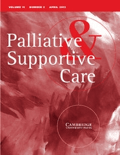
Palliative & Supportive Care
Enhancing Care Through Evidence and InsightPalliative & Supportive Care, published by Cambridge University Press, is a pivotal journal dedicated to advancing research and practice in the fields of palliative care, supportive care, and the psychological aspects of terminal and chronic illness. With a robust ISSN of 1478-9515 and an E-ISSN of 1478-9523, this esteemed journal has established itself as a vital resource for professionals, researchers, and students who are committed to improving the quality of life for patients facing serious health challenges. Featuring peer-reviewed articles that span clinical psychology, medicine, nursing, and psychiatry, it holds a respectable impact factor, ranking Q2 in Clinical Psychology, Medicine, and Nursing as per the 2023 category quartiles. The journal is based in the United Kingdom and has been contributing to the field since its inception in 2003. Although it currently does not offer Open Access, its rigorously curated content underscores its relevance and importance in facilitating interdisciplinary dialogue and innovation in palliative and supportive care. For those seeking to stay at the forefront of research, Palliative & Supportive Care remains an indispensable platform for scholarly communication and discovery.